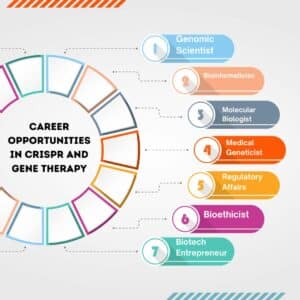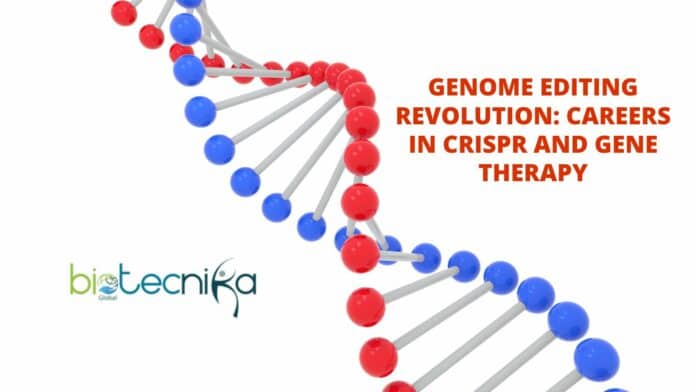Genome Editing Revolution: Careers in CRISPR and Gene Therapy
In the realm of biotechnology, few innovations have garnered as much attention and promise as CRISPR-Cas9, the revolutionary genome editing technology. CRISPR, short for Clustered Regularly Interspaced Short Palindromic Repeats, is a game-changer in the field of genetic engineering. It offers precise and efficient editing of genes, opening up remarkable possibilities in healthcare, agriculture, and beyond. This article delves into the fascinating world of CRISPR and gene therapy, exploring the careers that have emerged in this groundbreaking field.
Understanding CRISPR-Cas9:
In the rapidly evolving landscape of biotechnology, few breakthroughs have captured the imagination of scientists and the public alike as profoundly as CRISPR-Cas9. This revolutionary genome editing technology has ushered in a new era in genetic engineering, promising precision and efficiency that were once unimaginable. At its core, CRISPR-Cas9 is a powerful molecular tool that enables scientists to manipulate genes with an unprecedented level of accuracy. In this exploration of CRISPR-Cas9, we delve into the fundamental principles of this groundbreaking technology, its applications, and the ethical considerations that accompany its transformative potential.
The acronym CRISPR stands for Clustered Regularly Interspaced Short Palindromic Repeats, a mouthful that conceals its elegantly simple functionality. Originally discovered as part of the bacterial immune system, CRISPR sequences are a form of genetic memory that bacteria use to defend themselves against viral attacks. When a virus invades a bacterium, the bacterium captures a piece of the viral DNA and incorporates it into its own genome within CRISPR sequences. These sequences serve as a record of past infections, allowing the bacterium to recognize and mount a defense against the same virus in the future.
The true power of CRISPR technology comes to the fore with the addition of Cas9, an enzyme capable of acting as molecular scissors. When guided by a molecule of RNA, Cas9 can be precisely directed to a specific location in a genome, where it cleaves the DNA. This break in the DNA strand triggers the cell’s natural repair machinery to kick in, leading to the introduction of desired genetic changes in the process. This ability to cut, add, or replace specific DNA sequences has opened up a world of possibilities for genetic modification, both within the confines of laboratory research and for potential therapeutic applications.
The promise of CRISPR-Cas9 extends across various domains of science, from medicine and agriculture to biotechnology and beyond. In healthcare, researchers are exploring the potential to treat genetic diseases by repairing or replacing faulty genes. In agriculture, CRISPR offers the ability to engineer crops for greater resistance to pests, improved yields, and enhanced nutritional content. It has even found applications in the development of novel therapies, such as cancer treatments that target specific genetic mutations.
However, as with any transformative technology, the power of CRISPR-Cas9 also raises important ethical and societal questions. The ability to alter the fundamental building blocks of life brings with it profound moral considerations. These include concerns about the unintended consequences of genetic edits, the equitable distribution of benefits, and the potential misuse of the technology.
In this exploration of CRISPR-Cas9, we aim to unravel the intricacies of this remarkable technology. We will delve deeper into its mechanisms, its current and potential applications, and the ethical dilemmas that it presents. Whether you are a scientist on the cutting edge of genetic research or simply curious about the future of genetic engineering, this journey into the world of CRISPR-Cas9 promises to be an enlightening and thought-provoking one.
Career Opportunities in CRISPR and Gene Therapy:
Geneticist/Genomic Scientist: Geneticists and genomic scientists are at the forefront of CRISPR research. They design and conduct experiments to edit genes for various purposes, such as developing therapies for genetic diseases or enhancing crop traits in agriculture.
Bioinformatician: Bioinformaticians play a vital role in CRISPR research by analyzing the vast amount of data generated from gene sequencing. They use computational tools to identify target genes, predict outcomes of edits, and optimize the CRISPR-Cas9 process.

Molecular Biologist: Molecular biologists are responsible for the laboratory work involved in CRISPR experiments. They prepare DNA samples, perform gene editing procedures, and analyze results to determine the success of edits.
Medical Geneticist: Medical geneticists specialize in applying CRISPR and gene therapy to human healthcare. They diagnose and treat genetic disorders, develop personalized medicine approaches, and design clinical trials for gene therapy.
Bioethicist: With the power to edit genes, ethical considerations become paramount. Bioethicists in this field grapple with questions related to the moral and societal implications of CRISPR technology, helping shape responsible guidelines and policies.
Regulatory Affairs Specialist: Regulatory affairs specialists ensure that CRISPR-based therapies and products comply with government regulations. They navigate the complex landscape of approvals and oversee the regulatory processes.
Biotech Entrepreneur: Entrepreneurs in the biotech industry are capitalizing on the CRISPR revolution by founding startups focused on developing CRISPR-based diagnostics, therapies, and tools. They need a combination of scientific expertise and business acumen.
Educational Paths:
A career in CRISPR and gene therapy typically requires a strong educational foundation:
Bachelor’s Degree: Start with a bachelor’s degree in a relevant field like biology, genetics, or biotechnology.

Master’s Degree: Consider pursuing a master’s degree to specialize in a specific area, such as bioinformatics or biotechnology management.
Ph.D. or MD: For research-intensive or clinical roles, a Ph.D. or MD may be necessary. Doctoral programs provide in-depth knowledge and research experience.
Challenges and Ethical Considerations:
As with any groundbreaking technology, CRISPR and gene therapy face ethical and safety challenges. Concerns about unintended genetic consequences, equitable access to treatments, and the potential for misuse must be carefully addressed by professionals in the field.
The Future of CRISPR and Gene Therapy:
The future of CRISPR and gene therapy is filled with promise. Researchers are exploring applications for treating a wide range of genetic disorders, from cystic fibrosis to sickle cell anemia. In agriculture, CRISPR is being used to create crops with improved yields and resistance to pests.
Conclusion:
The genome editing revolution ushered in by CRISPR-Cas9 is transforming the world of biotechnology and genetics. Careers in CRISPR and gene therapy offer the opportunity to be part of a groundbreaking field that has the potential to revolutionize medicine, agriculture, and more. As this technology continues to advance, professionals in this field will play a pivotal role in shaping the future of science and healthcare. If you have a passion for genetics, a career in CRISPR and gene therapy might be your calling in this exciting biotechnological era.
Careers in CRISPR



